April 19, 2012
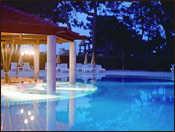 “Did you enjoy your stay?”
“Did you enjoy your stay?”
The question, posed by the young lady stationed at the reception desk of the Paloma Renaissance in Beldibi, carried no hint of being rehearsed. Doubtless it was something she had been trained to ask: the query’s formulation was as professional and crisp as her tan jacket. Nevertheless, she looked hopeful rather than stoic.
I smiled. “Yes, very much,” I replied, “we’ll be back.”
“Oh please do,” she said. She then offered me a card with some contact details so I could send in my feedback.
I thanked her and walked off to another part of the lobby; there, I awaited my bus back to the airport. As I settled into a dark brown leather sofa and held my other half’s hand, I took one last look around me: I’ve stayed in some very fine hotels, but I don’t recall ever being more comfortable. The first time I saw the Paloma Renaissance was after a long bus ride from the Antalya airport: beyond the resort’s gates, the drive was lined with tall trees. It looked cool, lush and inviting. When my girlfriend and I stepped into the lobby, we were impressed by the marble floors, the tasteful decor, and the very helpful bellhop who took our suitcases inside. Our room had a balcony which overlooked some magnificent mountains. The bed was super king sized. The main restaurant had enough delicious food to serve an army. The a la carte restaurants (in particular, Safran, which specialises in Turkish cuisine) were wonderful; the fresh hot Turkish bread went well with the hummus, the chicken kebab with bulgar wheat was mouthwatering. The Efes pilsner was good and cold, the Turkish coffee was strong and had the right amount of sugar when ordered “medium sweet”. On our first night, my other half and I strolled down to the beach: there was the scent of grilled fish in the air from the Sunset restaurant. We found two deck chairs and looked across the water to the bright lights of Antalya. The waves gently rolled in. There are few moments of perfect contentment in life, but that was one of them.
We did have a few hiccups: for example, there was a wake up call that kept disturbing us at 2:30 AM. The response from Tom of Customer Relations was exceptional: he not only changed our room, he also sent someone into our former accomodation at 2:30 AM to await the call. The phone rang, apparently; the next day we were sent flowers, fruit and a bottle of red Turkish wine as an apology.
Did I enjoy my stay? Absolutely. We’ll be back.
My memories of Turkey are not just confined to the pleasures of the Paloma Renaissance; for example, we visited the Roman ruins at Perge and Aspendos. This tour was only partially spoiled by the fact it was an excursion offered by Diana Travel: for example, our guide only knew about several paragraphs’ worth of information about Perge. She mentioned the Hittites and completely missed out that it was the home of the great Greek mathematician Apollonius of Perge, the man who gave us the ellipse, the parabola, and the hyperbola as we now know them. The missionary visits of St. Paul and St. Barnabas to the city were also left out; I looked up most of this information on Wikipedia later. Fortunately while I was there, imagination kicked in and I was able to envisage what it was like for myself; I’ve read Byzantine and Roman history sufficiently to have an idea of how it must have been. As I mused how the streets must have appeared, sounded and smelled when they teemed with Roman centurions, market traders and politicians, I passed by groups of German and French tourists: my German and French language skills are sufficient for me to know that they received a more thorough explanation and that their guides’ grasp of their languages was better than our guide’s English. Never mind. At Aspendos, I climbed to the top of the ancient amphitheatre once the guide left us to our own devices. It was precarious at times: the authorities had patched up some of the stones, but many were very worn down by time. I felt the heat of the afternoon sun on my neck, my heart pounded as I reached the top. When I finally got there, I looked down and waved to my other half who, perhaps wisely, had decided not to accompany me. She waved back, a tiny figure in the distance. I looked out of a portal and saw rolling green hills stretching off into the distance. The magnificent carvings in alabaster stone at the front of the amphitheatre were even better from an elevated angle. It was a moment when the stones of antiquity speak for people who don’t want to be forgotten; they aren’t.
Additional memories were provided by another Diana Travel excursion: my other half wanted to shop for gold and leather, I wanted to go to the old part of Antalya. We went on a trip which offered both. I had a mental image of how this would run: I thought we’d go to some souk in ancient Antalya, a place crammed with craftsmen selling leather jackets and gold trinkets made somewhere in the city’s winding back streets. My other half is an expert at haggling; I thought she’d enjoy it and we’d come away with some bargains. Then we’d be able to wander amidst the cobbled stone streets holding each other’s hand, alternating between sun and shade as we walked.
My heart sank when we were provided with the same tour guide as we had on the Perge and Aspendos excursion. My heart sank further when we were first shuffled into a large modern building belonging to a company called “D’Enver Leather” located not far from the city airport. We were seated in a room with a catwalk: the lights dimmed and models strutted out wearing a variety of leather outerwear. I did some mental arithmetic: to pay for the opulent building and the models, the prices would have to be extortionate. The lights went up and we were guided into a large showroom. My other half found a jacket she liked and looked at the label: it was in excess of €1800. We were told that we could bargain off about 60% of the price but even then the costs rivalled that of Paris, Milan and London and without the benefit of a designer label to justify the cost.
Shopping in Turkey is not for the fainthearted. Merchants are often practically doing cartwheels in front of you in order compel you to do business; at D’Enver, however, this commercial impulse was enhanced to the point of being positively creepy. My other half and I were followed around by a tall saleswoman with curly hair who refused to understand that we found the prices extortionate. Like many in our party, we fled quickly, but not before having to run the gauntlet of a concession which sells leather bags and belts, also at very high prices. Outside, however, there was relief: the sun was shining, the skies were clear blue. Two very young tabby cats were in a courtyard chasing crickets. One of them was quite friendly and bid us hello by rubbing its head up against us. I stroked its head in reply. “And now we’re happy,” my girlfriend stated. “Good morning,” I said to the kitten, “thank you for making the trip worthwhile.”
We proceeded out to an overpriced café where a large number of French and German tourists were waiting to leave; in retrospect, this probably was unsurprising as it was difficult to see how D’Enver catered to either French fashion consciousness or Teutonic frugality. In the distance, the mountain range which overshadows Antalya was on display: the snowcapped peaks were beautiful.
It should come as no surprise that the gold part of the tour was very similar to the leather portion. We were brought to the Club Hotel Sera on Lara Beach: the Turkish government sensibly banned gambling some time ago, so what was once the casino had been turned into a jewelry centre. We were again shuffled into a lobby; the decoration was a combination of over-gilded faux Ottoman Empire and Liberace; think of a Seventies American designer with a surplus of gold paint trying to capture ancient Oriental opulence and you’re not far off. We were met by an English speaking host. His name escapes me: I think of him as Mr. Smarm. He chided us in a rather oily way for not having visited Turkey or his hotel before; he suggested that the extravagant decor was Byzantine. Oh really? As there was no religious iconography and the effect was tacky rather than holy, this was a preposterous statement. Either he thought we were stupid or he simply hadn’t read his history. Never mind. Mr. Smarm told us, with a smile, that what lay ahead was “Heaven for ladies, hell for the gentlemen.”
Again, what we found was overpriced. One of the salesmen showed us a ring that he proudly boasted replicated a Tiffany setting; I wondered what Tiffany would think about this potential theft of intellectual property. After deflecting this advance, my other half wasn’t feeling too well: there were a couple of comfortable red chairs in a corner. A sign said that they were reserved for tour guides: given that no one was sitting there, we didn’t see the harm in her having a seat for a few moments. As she sat, we mused about the benefits that the tour guides get: we were provided a basic lunch on the Perge / Aspendos tour, our guide and the bus drivers had a separate table and much better food. Generally, tour guides get plush seats and free coffees. We also wondered if there were financial benefits, possibly a commission, accruing from the likes of D’Enver. We didn’t have much time to discuss this. Very shortly after we’d sat down, we were chased out by one of the salespeople. She told us curtly that if we wanted to rest, we’d have to go outside to the café. I gathered that the idea was to keep tourists flowing past the various display cases in order to keep the pressure on. I understand that people have to make a living, but pestering someone who was feeling unwell was too much; we left immediately. Again, we found ourselves in a café. It was even more overpriced than the last, and it was positioned by a dusty and busy road. But the sun shone through; despite the cost, I had another Turkish coffee.
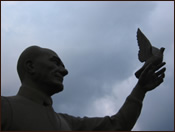 I think our guide gave up on the group after this point; my guess is, although we had paid for the tour, she saw us as tight-fisted and uncooperative English people who weren’t going to lay out the money so she could get a good commission. After a further bus journey, we arrived at the centre of Antalya; there is a large and impressive statue of Atatürk there, and she gave us a cursory explanation as to who he was, namely the “father of the country.” Well hang on, back up: there is a reason why his face is everywhere in Turkey. He appears on advertising billboards and on every banknote and coin; many of the shops I went into had his picture hanging on the wall. From a British perspective, it would be rather like finding Lloyd George’s portrait hanging up in every Tesco. The reason for this veneration is that Atatürk saved his country and set it on a modernising course: after the end of World War I, in which Turkey was allied to the defeated Central Powers of Germany, Austria and Bulgaria, the empire was smashed up, the Sultanate discredited and dissolved. Atatürk defeated a Greek invasion, clawed back territory, set up the Republic, encouraged science, education and industry and went so far as to switch the Turkish alphabet from Arabic script to European letters. More importantly, he restored the nation’s pride: in my experience, only the United States utilises its flag as often and in so many ways as a motif as Turkey does. He is central to understanding modern Turkey. He’s also the man responsible for setting up the systems and laws which enabled our guide to have her career, such as it is: treating him so lightly bordered on disrespect. I was glad to get away and proceed into the heart of the old town with my other half’s hand in mine.
I think our guide gave up on the group after this point; my guess is, although we had paid for the tour, she saw us as tight-fisted and uncooperative English people who weren’t going to lay out the money so she could get a good commission. After a further bus journey, we arrived at the centre of Antalya; there is a large and impressive statue of Atatürk there, and she gave us a cursory explanation as to who he was, namely the “father of the country.” Well hang on, back up: there is a reason why his face is everywhere in Turkey. He appears on advertising billboards and on every banknote and coin; many of the shops I went into had his picture hanging on the wall. From a British perspective, it would be rather like finding Lloyd George’s portrait hanging up in every Tesco. The reason for this veneration is that Atatürk saved his country and set it on a modernising course: after the end of World War I, in which Turkey was allied to the defeated Central Powers of Germany, Austria and Bulgaria, the empire was smashed up, the Sultanate discredited and dissolved. Atatürk defeated a Greek invasion, clawed back territory, set up the Republic, encouraged science, education and industry and went so far as to switch the Turkish alphabet from Arabic script to European letters. More importantly, he restored the nation’s pride: in my experience, only the United States utilises its flag as often and in so many ways as a motif as Turkey does. He is central to understanding modern Turkey. He’s also the man responsible for setting up the systems and laws which enabled our guide to have her career, such as it is: treating him so lightly bordered on disrespect. I was glad to get away and proceed into the heart of the old town with my other half’s hand in mine.
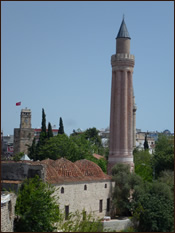 We did have one more commercial interaction that bordered on the shuddersome. As we passed two gentlemen sipping Turkish tea, we were asked where we were from. My other half replied “England”; this was a mistake. A thin fellow with a balding head and extravagant moustache came over and told us that his cousin lived in Newcastle but had a home in Antalya. He lured us into his silver shop and showed us an anonymous picture of a baby on his mobile phone: apparently this was his nephew. He then invited my girlfriend to examine his wares: she wasn’t particularly impressed. We politely told him we wanted some lunch: he recommended a restaurant just further along and wrote down its name and the name of its owner. He made us promise to come back for tea later.
We did have one more commercial interaction that bordered on the shuddersome. As we passed two gentlemen sipping Turkish tea, we were asked where we were from. My other half replied “England”; this was a mistake. A thin fellow with a balding head and extravagant moustache came over and told us that his cousin lived in Newcastle but had a home in Antalya. He lured us into his silver shop and showed us an anonymous picture of a baby on his mobile phone: apparently this was his nephew. He then invited my girlfriend to examine his wares: she wasn’t particularly impressed. We politely told him we wanted some lunch: he recommended a restaurant just further along and wrote down its name and the name of its owner. He made us promise to come back for tea later.
We found the restaurant: it was in a sunny courtyard next to some crumbling stone buildings. The furniture was basic black aluminium lawn chairs with cushions adorned with a red tulip pattern. Nevertheless, there was a certain amount of pride: the flowers in the centre of the table were fresh, and the beer was cold. The grilled chicken in paprika was tasty; however, time was short and we settled up with the owner, a burly gentleman wearing a blue and white striped shirt. He saw the piece of paper given to us by the silversmith: he explained that the silversmith was his “friend” and they were both Kurds.
“The Mayor of Old Antalya,” I thought. Down the winding streets of this old town, I imagined, everyone knows each other; I guessed he knew more than most.
My girlfriend and I proceeded deeper: there were more cartwheels of commerce turned in our path. However, we finally happened on a silver shop she liked. The window frames of the store were made of polished light oak; the displays were less ostentatious than most, indeed, tasteful and laid out in green velvet. We went in and met the silversmith: he was a short man who wore wire frame glasses and had thin grey hair. The tools of the gentleman’s trade were resting on a desk, a white and grey cat was fast asleep on a chair with a green cushion. As a cat owner, I know that they are very selective about whom they choose to associate themselves with: the fact that the cat had chosen this jewelery shop to rest was a good reference. We talked for a while, my other half tried on several rings. Time was pressing: we took his card and proceeded on.
We continued in what appeared to be a long, winding loop: I smiled and gripped my girlfriend’s hand more tightly. This was the walk in sun and shade that I so desired. Then all of a sudden, the Mayor of Old Antalya emerged from another silver shop. He was not threatening, but it was uncanny to say the least: he queried us about our promise to have tea with him. We told him, truthfully, that we were doing a tour around the old town and that we wanted to go to the mosque. He led us through the back streets, being careful not to pass any other store. A man with grey hair and a sizeable belly came up to the Mayor, with what I presume was his young son in tow. The man seemed somewhat desperate; he pleaded for something. The Mayor carried on regardless, only throwing a few words over his shoulder. Somehow we escaped with quick apologies and made it to the safety of Antalya’s old mosque.
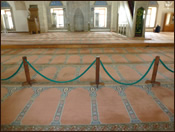 I entered it with bare feet; my other half covered her head with a sheer green cloth. The red and blue carpet, marked out in individual squares for worshippers, was soft. In the corner by a window, a man sat on his knees and quietly read what I presume was the Qur’an. Two gentlemen in another corner knelt and prayed. There was a stone stairway up to what looked like an altar with a scroll draped in green velvet with gold lettering: I presume that was the Qur’an in scroll format. I looked up at the dome; black plaques with gold Arabic script were positioned around its base. I whispered to myself “In the beginning there was the Word, and the Word was God”. It was one of the few places in the city that wasn’t bustling. I enjoyed the moment of peace. We left quietly.
I entered it with bare feet; my other half covered her head with a sheer green cloth. The red and blue carpet, marked out in individual squares for worshippers, was soft. In the corner by a window, a man sat on his knees and quietly read what I presume was the Qur’an. Two gentlemen in another corner knelt and prayed. There was a stone stairway up to what looked like an altar with a scroll draped in green velvet with gold lettering: I presume that was the Qur’an in scroll format. I looked up at the dome; black plaques with gold Arabic script were positioned around its base. I whispered to myself “In the beginning there was the Word, and the Word was God”. It was one of the few places in the city that wasn’t bustling. I enjoyed the moment of peace. We left quietly.
As I think about it, there are many memories which rush in. I recall the remarkable taste of mulberry flavoured Turkish Delight, a confection that puts our terrible facsimilies to shame. I remember the food market at the town of Göynük and the fish seller who was delighted to be photographed and the taste of green almonds. I recollect sweating in places I didn’t know I could perspire from at a Turkish bath. I think about my struggles with a hammock on the grounds of the Paloma Renaissance and finally settling in, watching the beach and the waves beyond the end of my feet. I recall staying up beyond midnight writing and sipping yet another Turkish coffee. I remember waking up late and feeling like it didn’t matter, and truthfully, it didn’t. I remember dipping my feet into the clear water of the Mediterranean, only to find it was very cold but nonetheless refreshing. Not everything beyond the Paloma Renaissance was perfect, but it’s seldom that the best vacations are totally pristine: it’s a combination of sights, sounds, tastes, experiences that allow one to luxuriate in one’s comfort zone and just as firmly be pushed out of it.
The young lady at the front desk who asked me if I enjoyed my stay couldn’t know how good everything had been. I’d built up a treasure trove of memories which I’ll revisit long after the last piece of mulberry Turkish Delight is consumed. Yes, we’ll be back: though next time we’ll bring a bigger guide book and rent a car rather than go on a pre-arranged excursion. We’ll find the souks we seek and explore much beyond Antalya; I saw on my last day that the Paloma offers a quick Turkish language lesson on Fridays, we’ll do that too. Yes, we’ll definitely be back. Above all, it’s passing sweet to know that our potential hosts’ reply to this prospect is “Please do.”
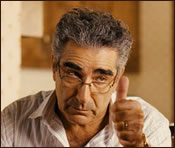 The first episode of Michael Palin’s “Ripping Yarns” began with a quote from G. K. Chesterton: “The follies of men’s youth are in retrospect glorious compared to the follies of old age.” I didn’t expect to think of this when I bought my tickets to see “American Pie: Reunion”. I thought I’d get a dose of comedy and it would be ridiculous and awkward. I also had the passing fear that it would be an absolute stinker. After all, I thought, it could be a teenage comedy that lacked teenagers. But a statement about youth and old age and the follies that befall both? That seemed unlikely.
The first episode of Michael Palin’s “Ripping Yarns” began with a quote from G. K. Chesterton: “The follies of men’s youth are in retrospect glorious compared to the follies of old age.” I didn’t expect to think of this when I bought my tickets to see “American Pie: Reunion”. I thought I’d get a dose of comedy and it would be ridiculous and awkward. I also had the passing fear that it would be an absolute stinker. After all, I thought, it could be a teenage comedy that lacked teenagers. But a statement about youth and old age and the follies that befall both? That seemed unlikely.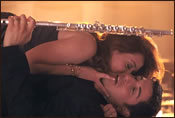 This film doesn’t succeed on every level; Michelle’s outrage at Jim’s antics seems overblown, especially since she’s known since 1999 that he’s a well meaning if accident prone goofball. Less is perhaps made of the fact that Jim is a father than could have been done; his little boy mimicking some of his behaviours and words was perhaps a missed comic opportunity. The teenagers are uniformly attractive, as if they’d walked out of lingerie and sportswear catalogues: the main characters remark that the young women are “sluttier” than they used to be, perhaps a nod to the fact that the original film presented adolescents as not necessarily being at all attractive. Too much effort may have been made in including all the characters from the original: for example, this film bothered to include two minor ones (two boys who repeatedly shouted “MILF” at a portrait of Stiffler’s mother) which I’d completely forgotten. I didn’t need to know that the pages of Jim’s teenage pornographic magazine collection were stuck together. A cameo by the still extremely alluring Rebecca de Mornay was much too contrived and obvious. Michelle and Jim’s reconciliation in a high school band room was as silly as much as it was touching.
This film doesn’t succeed on every level; Michelle’s outrage at Jim’s antics seems overblown, especially since she’s known since 1999 that he’s a well meaning if accident prone goofball. Less is perhaps made of the fact that Jim is a father than could have been done; his little boy mimicking some of his behaviours and words was perhaps a missed comic opportunity. The teenagers are uniformly attractive, as if they’d walked out of lingerie and sportswear catalogues: the main characters remark that the young women are “sluttier” than they used to be, perhaps a nod to the fact that the original film presented adolescents as not necessarily being at all attractive. Too much effort may have been made in including all the characters from the original: for example, this film bothered to include two minor ones (two boys who repeatedly shouted “MILF” at a portrait of Stiffler’s mother) which I’d completely forgotten. I didn’t need to know that the pages of Jim’s teenage pornographic magazine collection were stuck together. A cameo by the still extremely alluring Rebecca de Mornay was much too contrived and obvious. Michelle and Jim’s reconciliation in a high school band room was as silly as much as it was touching.
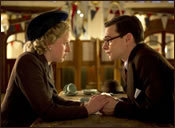 Jim Broadbent, a fine actor, is wasted. The Denis Thatcher of this film is almost a cardboard cutout of the man, precisely what he was portrayed as by the press: an amiable, if somewhat inebriated, fellow who had a touch of the buffoon about him. For example, after the bomb in Brighton goes off, he is, rather oddly, left holding his shoes. Surely there must have been more to him than this comic figure in order to appeal to someone of Lady Thatcher’s intellect and ambition; I recall reading in one of her books that she said of him, “What a man.” An elaboration of what brought on such an admiring phrase would have been apropos. Or was this statement a sop to someone weak and pliable? The film doesn’t say. Rather, we have a few cliched images of Young Denis and Young Margaret holding hands as they attend a performance of “The King and I” and the opera. When Denis proposes, young Margaret rather oddly and uncharacteristically bursts into tears.
Jim Broadbent, a fine actor, is wasted. The Denis Thatcher of this film is almost a cardboard cutout of the man, precisely what he was portrayed as by the press: an amiable, if somewhat inebriated, fellow who had a touch of the buffoon about him. For example, after the bomb in Brighton goes off, he is, rather oddly, left holding his shoes. Surely there must have been more to him than this comic figure in order to appeal to someone of Lady Thatcher’s intellect and ambition; I recall reading in one of her books that she said of him, “What a man.” An elaboration of what brought on such an admiring phrase would have been apropos. Or was this statement a sop to someone weak and pliable? The film doesn’t say. Rather, we have a few cliched images of Young Denis and Young Margaret holding hands as they attend a performance of “The King and I” and the opera. When Denis proposes, young Margaret rather oddly and uncharacteristically bursts into tears.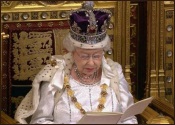 The Queen’s Speech was long on pomp, short on circumstance. I’ve listened to a fair few of them since I arrived in Britain over 20 years ago, but I don’t recall one quite like this. The Queen is a consummate professional, and she usually reads out these speeches without any trace of emotion. Her words are deliberate, her tone is steady. However, this year I thought I heard a difference: it sounded to me as if she was bored. The programme she outlined was singularly unambitious: we’ll attend to the economy, it stated. Well, given that this is at the forefront of everyone’s mind, this item was no particular surprise. It said, we’ll do House of Lords reform, if we can: meaning, if the Coalition partners and Labour can stop bickering over it. We’ll improve the lives of children: and here I was thinking that they would publically state they’d take away their pocket money and teddy bears. We’ll reform the banks: hopefully, but given how hand in glove the Conservatives have been with financiers and how in thrall to money they remain, good luck with that. Apart from this, it was small ball, small beer, a shrunken, shrivelled agenda which will achieve, at best, incremental change.
The Queen’s Speech was long on pomp, short on circumstance. I’ve listened to a fair few of them since I arrived in Britain over 20 years ago, but I don’t recall one quite like this. The Queen is a consummate professional, and she usually reads out these speeches without any trace of emotion. Her words are deliberate, her tone is steady. However, this year I thought I heard a difference: it sounded to me as if she was bored. The programme she outlined was singularly unambitious: we’ll attend to the economy, it stated. Well, given that this is at the forefront of everyone’s mind, this item was no particular surprise. It said, we’ll do House of Lords reform, if we can: meaning, if the Coalition partners and Labour can stop bickering over it. We’ll improve the lives of children: and here I was thinking that they would publically state they’d take away their pocket money and teddy bears. We’ll reform the banks: hopefully, but given how hand in glove the Conservatives have been with financiers and how in thrall to money they remain, good luck with that. Apart from this, it was small ball, small beer, a shrunken, shrivelled agenda which will achieve, at best, incremental change.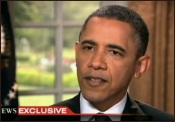 Or maybe not. If the Queen’s Speech was a profile in timidity, yesterday, President Obama provided starkly contrasting portrait of courage.
Or maybe not. If the Queen’s Speech was a profile in timidity, yesterday, President Obama provided starkly contrasting portrait of courage.  The Left had much to celebrate over the long weekend: not only was the Conservative Party routed in Britain’s local elections, the triumph of Hollande over Sarkozy in France and the success of socialist and social democratic parties in Greece and Schleswig Holstein suggest that the political tide is turning red. Austerity has been discredited; Hollande has promised to provide hope to all of Europe. Perhaps this political change may lead to genuine change. It is a precious moment, one in which optimism is in the ascendant.
The Left had much to celebrate over the long weekend: not only was the Conservative Party routed in Britain’s local elections, the triumph of Hollande over Sarkozy in France and the success of socialist and social democratic parties in Greece and Schleswig Holstein suggest that the political tide is turning red. Austerity has been discredited; Hollande has promised to provide hope to all of Europe. Perhaps this political change may lead to genuine change. It is a precious moment, one in which optimism is in the ascendant.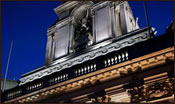 As the final results of the 2012 local election were tallied and reported, London was the place to be. I hadn’t planned nor scheduled it this way: it was a mysterious happenstance that meant that just before Boris Johnson’s re-election as Mayor was confirmed, I was making my way back to my hotel in the shadow of the Tower of London. I was arm in arm with my other half; we proceeded slowly, burdened by fatigue from a long journey and devouring a tastily carnivorous if overpriced meal at an American barbeque restaurant. The loving marriage between American Samuel Adams lager and a pint glass perhaps hadn’t helped matters. Sleep had entered my eyes, the compelling gravity inviting me to shut out the world. Everything seemed to be beckoning me to get to my hotel room as quickly as possible, and lay my head down on the crisp white pillows.
As the final results of the 2012 local election were tallied and reported, London was the place to be. I hadn’t planned nor scheduled it this way: it was a mysterious happenstance that meant that just before Boris Johnson’s re-election as Mayor was confirmed, I was making my way back to my hotel in the shadow of the Tower of London. I was arm in arm with my other half; we proceeded slowly, burdened by fatigue from a long journey and devouring a tastily carnivorous if overpriced meal at an American barbeque restaurant. The loving marriage between American Samuel Adams lager and a pint glass perhaps hadn’t helped matters. Sleep had entered my eyes, the compelling gravity inviting me to shut out the world. Everything seemed to be beckoning me to get to my hotel room as quickly as possible, and lay my head down on the crisp white pillows.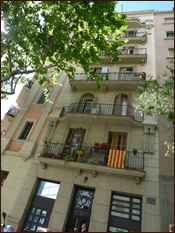 Last weekend’s edition of the Financial Times led with three articles about Spain. They catalogued nothing but misery: a quarter of Spaniards are unemployed, the country’s financial position is worsening, Spain’s bonds have been downgraded by two notches, Spain is crying out for help, seemingly into a void. The FT’s attention is justified; Spain is important, Spain matters. If Spain falls prey to the markets, it could take the entire Euro system with it. It’s clear there are not enough reserves, not in Germany, not in the entire solvent portion of the European Union, to save them. A Spanish collapse could lead to a renewed global downturn.
Last weekend’s edition of the Financial Times led with three articles about Spain. They catalogued nothing but misery: a quarter of Spaniards are unemployed, the country’s financial position is worsening, Spain’s bonds have been downgraded by two notches, Spain is crying out for help, seemingly into a void. The FT’s attention is justified; Spain is important, Spain matters. If Spain falls prey to the markets, it could take the entire Euro system with it. It’s clear there are not enough reserves, not in Germany, not in the entire solvent portion of the European Union, to save them. A Spanish collapse could lead to a renewed global downturn.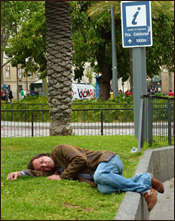 The damage caused by an economic detonation is far more subtle and much more complicated to clean up. While El Jardi is full of tourists, not far from there are stores going into final liquidation, screaming out in black letters on flourescent yellow signs that every last bit of stock must be sold. A man sleeps on a bit of grass at the harbour end of Las Ramblas: his Levis and brown jacket hint at former prosperity, the holes in both garments and his leathery skin indicate his good fortune’s passing. His face is turned towards the direction pointed to by the statue of Columbus, out to sea. Switch on the television back at the hotel: the queue of unemployed cover their faces as the news cameras film them going into the welfare office. Projects outside Barcelona appear to be abandoned: the station at Vila Seca bears a sign promising redevelopment by the Ministry of Transport, however, the concrete on the platform is broken, unfinished, guarded by a temporary steel fence that looks all too permanent. Graffiti, a scream of protest in paint, is everywhere in Catalonia: two young men assault the walls of Vila Seca’s railway yard with spray cans and are entirely unmolested and unchallenged. In Barcelona itself, the iron shutters which protect stores are also marked: virtually everywhere has at least some squiggle, line or scrawl. The metal sheds outside Barcelona Sants train station bear legends calling for revolution with the crossed out A for anarchy. So much for the gilded dreams of 1992’s “beautiful horizon” or the artistic meanderings of Vicky Cristina: the Barcelona of “Biutiful” seems to be chewing the rest of city up, bit by agonising bit. It is a template for disappointment, despair and perhaps even violence. Spain and Catalonia cry out, Barcelona bleeds, but because the wounds rarely are as striking as the image of a once prosperous man sleeping incongruously on a tiny patch of grass, it is ignored, consigned to warnings on the financial pages.
The damage caused by an economic detonation is far more subtle and much more complicated to clean up. While El Jardi is full of tourists, not far from there are stores going into final liquidation, screaming out in black letters on flourescent yellow signs that every last bit of stock must be sold. A man sleeps on a bit of grass at the harbour end of Las Ramblas: his Levis and brown jacket hint at former prosperity, the holes in both garments and his leathery skin indicate his good fortune’s passing. His face is turned towards the direction pointed to by the statue of Columbus, out to sea. Switch on the television back at the hotel: the queue of unemployed cover their faces as the news cameras film them going into the welfare office. Projects outside Barcelona appear to be abandoned: the station at Vila Seca bears a sign promising redevelopment by the Ministry of Transport, however, the concrete on the platform is broken, unfinished, guarded by a temporary steel fence that looks all too permanent. Graffiti, a scream of protest in paint, is everywhere in Catalonia: two young men assault the walls of Vila Seca’s railway yard with spray cans and are entirely unmolested and unchallenged. In Barcelona itself, the iron shutters which protect stores are also marked: virtually everywhere has at least some squiggle, line or scrawl. The metal sheds outside Barcelona Sants train station bear legends calling for revolution with the crossed out A for anarchy. So much for the gilded dreams of 1992’s “beautiful horizon” or the artistic meanderings of Vicky Cristina: the Barcelona of “Biutiful” seems to be chewing the rest of city up, bit by agonising bit. It is a template for disappointment, despair and perhaps even violence. Spain and Catalonia cry out, Barcelona bleeds, but because the wounds rarely are as striking as the image of a once prosperous man sleeping incongruously on a tiny patch of grass, it is ignored, consigned to warnings on the financial pages.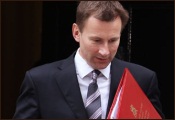 Outrage, but no surprise. Jeremy Hunt’s close relationship with Rupert Murdoch’s empire is the subject of widespread disgust, nevertheless, genuine shock is rare. I was once told that each political party specialised in a particular type of scandal: the Conservatives’ corruption usually involved sex, e.g. David Mellor’s spanking activities while wearing Chelsea Football Club gear, and the Labour Party’s usually involved money, e.g. donations by Bernie Ecclestone to preserve Formula One’s exemeption from tobacco advertising regulations. This truism exists, perhaps, because everyone expects Conservatives to be on the take: look at their acolytes, whether dressed in chalk stripe suits or rolled up Armani shirtsleeves. The odour of privilege goes before them, stinking out the sensibilities of anyone who sees the love of money as pernicious. Jeremy Hunt, closely allied to Rupert & Co? Outrageous, disgusting, terrible, it shouldn’t happen: but is anyone really surprised? Without surprise, is it that much of a scandal?
Outrage, but no surprise. Jeremy Hunt’s close relationship with Rupert Murdoch’s empire is the subject of widespread disgust, nevertheless, genuine shock is rare. I was once told that each political party specialised in a particular type of scandal: the Conservatives’ corruption usually involved sex, e.g. David Mellor’s spanking activities while wearing Chelsea Football Club gear, and the Labour Party’s usually involved money, e.g. donations by Bernie Ecclestone to preserve Formula One’s exemeption from tobacco advertising regulations. This truism exists, perhaps, because everyone expects Conservatives to be on the take: look at their acolytes, whether dressed in chalk stripe suits or rolled up Armani shirtsleeves. The odour of privilege goes before them, stinking out the sensibilities of anyone who sees the love of money as pernicious. Jeremy Hunt, closely allied to Rupert & Co? Outrageous, disgusting, terrible, it shouldn’t happen: but is anyone really surprised? Without surprise, is it that much of a scandal?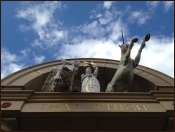 The Trafford Centre is an undeniably impressive place. I could see its large glass dome from the motorway. The areas allotted for car parking are vast. I went in along with my other half via an signpost marked “The Orient”: this was followed by a set of tall columns and a stone statue bearing gilded lightning bolts which overlooked the huddled masses of automobiles. Inside, it was just as palatial: a gargantuan set of marble steps led up to the first floor. As we proceeded further inward, we saw a “cruise ship” motif take hold, complete with lifeboats and a painted starry sky above. The Centre’s “neighbourhoods” such as “China Town” and “New Orelans” were just as passable as anything I’d seen at Epcot Centre. It is truly a temple to modern consumerism.
The Trafford Centre is an undeniably impressive place. I could see its large glass dome from the motorway. The areas allotted for car parking are vast. I went in along with my other half via an signpost marked “The Orient”: this was followed by a set of tall columns and a stone statue bearing gilded lightning bolts which overlooked the huddled masses of automobiles. Inside, it was just as palatial: a gargantuan set of marble steps led up to the first floor. As we proceeded further inward, we saw a “cruise ship” motif take hold, complete with lifeboats and a painted starry sky above. The Centre’s “neighbourhoods” such as “China Town” and “New Orelans” were just as passable as anything I’d seen at Epcot Centre. It is truly a temple to modern consumerism. “Did you enjoy your stay?”
“Did you enjoy your stay?” I think our guide gave up on the group after this point; my guess is, although we had paid for the tour, she saw us as tight-fisted and uncooperative English people who weren’t going to lay out the money so she could get a good commission. After a further bus journey, we arrived at the centre of Antalya; there is a large and impressive statue of Atatürk there, and she gave us a cursory explanation as to who he was, namely the “father of the country.” Well hang on, back up: there is a reason why his face is everywhere in Turkey. He appears on advertising billboards and on every banknote and coin; many of the shops I went into had his picture hanging on the wall. From a British perspective, it would be rather like finding Lloyd George’s portrait hanging up in every Tesco. The reason for this veneration is that Atatürk saved his country and set it on a modernising course: after the end of World War I, in which Turkey was allied to the defeated Central Powers of Germany, Austria and Bulgaria, the empire was smashed up, the Sultanate discredited and dissolved. Atatürk defeated a Greek invasion, clawed back territory, set up the Republic, encouraged science, education and industry and went so far as to switch the Turkish alphabet from Arabic script to European letters. More importantly, he restored the nation’s pride: in my experience, only the United States utilises its flag as often and in so many ways as a motif as Turkey does. He is central to understanding modern Turkey. He’s also the man responsible for setting up the systems and laws which enabled our guide to have her career, such as it is: treating him so lightly bordered on disrespect. I was glad to get away and proceed into the heart of the old town with my other half’s hand in mine.
I think our guide gave up on the group after this point; my guess is, although we had paid for the tour, she saw us as tight-fisted and uncooperative English people who weren’t going to lay out the money so she could get a good commission. After a further bus journey, we arrived at the centre of Antalya; there is a large and impressive statue of Atatürk there, and she gave us a cursory explanation as to who he was, namely the “father of the country.” Well hang on, back up: there is a reason why his face is everywhere in Turkey. He appears on advertising billboards and on every banknote and coin; many of the shops I went into had his picture hanging on the wall. From a British perspective, it would be rather like finding Lloyd George’s portrait hanging up in every Tesco. The reason for this veneration is that Atatürk saved his country and set it on a modernising course: after the end of World War I, in which Turkey was allied to the defeated Central Powers of Germany, Austria and Bulgaria, the empire was smashed up, the Sultanate discredited and dissolved. Atatürk defeated a Greek invasion, clawed back territory, set up the Republic, encouraged science, education and industry and went so far as to switch the Turkish alphabet from Arabic script to European letters. More importantly, he restored the nation’s pride: in my experience, only the United States utilises its flag as often and in so many ways as a motif as Turkey does. He is central to understanding modern Turkey. He’s also the man responsible for setting up the systems and laws which enabled our guide to have her career, such as it is: treating him so lightly bordered on disrespect. I was glad to get away and proceed into the heart of the old town with my other half’s hand in mine. We did have one more commercial interaction that bordered on the shuddersome. As we passed two gentlemen sipping Turkish tea, we were asked where we were from. My other half replied “England”; this was a mistake. A thin fellow with a balding head and extravagant moustache came over and told us that his cousin lived in Newcastle but had a home in Antalya. He lured us into his silver shop and showed us an anonymous picture of a baby on his mobile phone: apparently this was his nephew. He then invited my girlfriend to examine his wares: she wasn’t particularly impressed. We politely told him we wanted some lunch: he recommended a restaurant just further along and wrote down its name and the name of its owner. He made us promise to come back for tea later.
We did have one more commercial interaction that bordered on the shuddersome. As we passed two gentlemen sipping Turkish tea, we were asked where we were from. My other half replied “England”; this was a mistake. A thin fellow with a balding head and extravagant moustache came over and told us that his cousin lived in Newcastle but had a home in Antalya. He lured us into his silver shop and showed us an anonymous picture of a baby on his mobile phone: apparently this was his nephew. He then invited my girlfriend to examine his wares: she wasn’t particularly impressed. We politely told him we wanted some lunch: he recommended a restaurant just further along and wrote down its name and the name of its owner. He made us promise to come back for tea later. I entered it with bare feet; my other half covered her head with a sheer green cloth. The red and blue carpet, marked out in individual squares for worshippers, was soft. In the corner by a window, a man sat on his knees and quietly read what I presume was the Qur’an. Two gentlemen in another corner knelt and prayed. There was a stone stairway up to what looked like an altar with a scroll draped in green velvet with gold lettering: I presume that was the Qur’an in scroll format. I looked up at the dome; black plaques with gold Arabic script were positioned around its base. I whispered to myself “In the beginning there was the Word, and the Word was God”. It was one of the few places in the city that wasn’t bustling. I enjoyed the moment of peace. We left quietly.
I entered it with bare feet; my other half covered her head with a sheer green cloth. The red and blue carpet, marked out in individual squares for worshippers, was soft. In the corner by a window, a man sat on his knees and quietly read what I presume was the Qur’an. Two gentlemen in another corner knelt and prayed. There was a stone stairway up to what looked like an altar with a scroll draped in green velvet with gold lettering: I presume that was the Qur’an in scroll format. I looked up at the dome; black plaques with gold Arabic script were positioned around its base. I whispered to myself “In the beginning there was the Word, and the Word was God”. It was one of the few places in the city that wasn’t bustling. I enjoyed the moment of peace. We left quietly.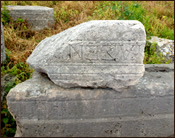 I have been to a dead city. I am not referring to a town that inspires the sentiment of “Marietta’s Lied” from Korngold’s “Die Töte Stadt”; rather, I speak of the Roman city of Perge. It once thrived but now only is home to stray dogs, of which there are many to be seen sleeping amongst the ruins, and tiny black tadpoles in stagnant pools. These residents cannot appreciate the cracked marble which once adorned magnificent facades, the deep cold pool of a Roman bath which once was filled with water and now contains only brown and green moss growing on its floor. They don’t know that it was a place of learning: the famous Greek mathematician Apollonius of Perga once resided there. They have no means to discern that it had significance in the life of St. Paul and his companion St. Barnabas, who preached there twice.
I have been to a dead city. I am not referring to a town that inspires the sentiment of “Marietta’s Lied” from Korngold’s “Die Töte Stadt”; rather, I speak of the Roman city of Perge. It once thrived but now only is home to stray dogs, of which there are many to be seen sleeping amongst the ruins, and tiny black tadpoles in stagnant pools. These residents cannot appreciate the cracked marble which once adorned magnificent facades, the deep cold pool of a Roman bath which once was filled with water and now contains only brown and green moss growing on its floor. They don’t know that it was a place of learning: the famous Greek mathematician Apollonius of Perga once resided there. They have no means to discern that it had significance in the life of St. Paul and his companion St. Barnabas, who preached there twice. I'm a Doctor of both Creative Writing and Manufacturing and Mechanical Engineering, a novelist, a technologist, and still an amateur in much else.
I'm a Doctor of both Creative Writing and Manufacturing and Mechanical Engineering, a novelist, a technologist, and still an amateur in much else.




